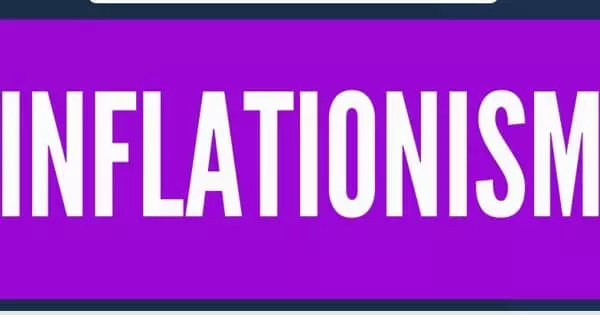Inflationism is a controversial economic, fiscal, or monetary policy that holds that a significant level of inflation is harmless, desirable, or even advantageous. It is the policy or practice of inflating the currency or bank deposits. In the same way, inflationist economists advocate for an inflationary policy.
In today’s parlance, inflation is defined as deficit spending and deliberate credit expansion on a national scale, a massive public policy blunder of creating too much money to chase too few goods. It is based on the “money illusion,” a widespread misunderstanding of income as a flow of money versus income as a flow of goods and services, a misunderstanding of “money” and wealth.
The policy of economic inflation is known as inflationism. Mainstream economics believes that inflation is a necessary evil and advocates for low, stable inflation, and is thus largely opposed to inflationist policies – some inflation is necessary, but inflation above a certain level is undesirable. However, deflation is frequently regarded as a greater or equal threat, particularly in Keynesian economics, Monetarist economics, and debt deflation theory.
Inflation is not widely accepted in the economics community, and it is frequently confused with Modern Monetary Theory, which employs similar arguments, particularly in relation to chartism. The observation of Lord Keynes is not without irony. Later, Keynes would become enamored with the concept of inflationism, becoming, according to the record, the most powerful if inadvertent advocate of that creed in the Twentieth Century.
Inflationism, according to Keynes, was an idea whose time had come, arriving during the Great Depression when people and politicians were desperate for solutions, almost any solution. Furthermore, the Keynesian solution was not disguised as inflation, but as a means of alleviating insufficient aggregate demand through “temporary” or “counter-cyclical” deficit spending, with the goal of achieving a balanced budget over a business cycle, over a period of years.
Inflationism is most commonly associated with, and a charge leveled against, schools of economic thought that advocate for government intervention, either fiscal or monetary policy, to achieve full employment. These schools of thought are frequently heterodox in their approach to monetary economics. The Birmingham School of economics, which advocated expansionary monetary policy to achieve full employment in the early nineteenth century, was derided as “crude inflationists.”
More importantly, as implied by the title, the Buchanan-Wagner critique of Keynesian economics focuses on its political implications, specifically how these implications have long influenced economic policy decisions since the Great Depression—decisions that have culminated in the global Keynesian Revolution.















